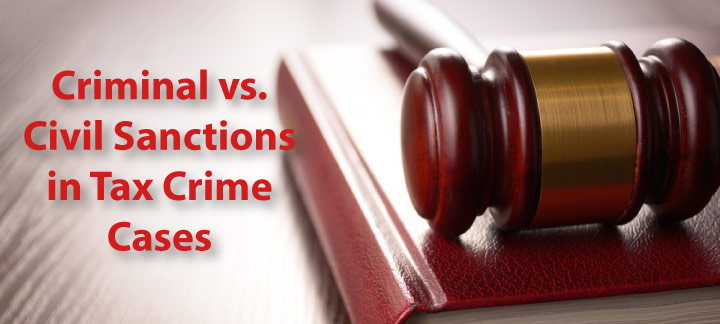Criminal Versus Civil Sanctions For Tax Crimes
Criminal and civil sanctions against IRS tax fraud are not mutually exclusive. As a practical matter, civil and criminal tax fraud penalties are treated independently and a taxpayer can easily be subject to both at the same time. If a taxpayer has been convicted of a tax crime and hit with severe criminal sanctions, he or she may still receive civil sanctions as well. In fact, the IRS is even more likely to try to receive civil sanctions after the taxpayer has already been charged and convicted of a tax crime. Even when a taxpayer receives an acquittal in the criminal tax case, the IRS can still assess civil penalties against him or her. In civil fraud cases, the IRS does not have the burden of proving fraud beyond a reasonable doubt, so it is much easier to impose civil penalties upon the taxpayer. Instead, the IRS need only prove its case by clear and convincing evidence in a civil fraud case.
Once the IRS has decided to commence a criminal tax investigation against a taxpayer, the taxpayer cannot make an offer to pay all taxes, interest, or penalties in an attempt to escape prosecution. In fact, neither the IRS nor the Justice Department will even factor such an offer into their criminal investigation.
What are the Consequences of a Criminal Felony Tax Offense?
The consequences of a felony tax offense conviction can be potentially devastating to the taxpayer. For each conviction of tax evasion, there is a possible five-year term of imprisonment and a criminal fine of up to $250,000. The IRS also typically seeks to collect the underlying tax and interest, as well as a civil fraud penalty and a substantial understatement penalty for each year that the taxpayer was convicted of a tax fraud scheme. The civil fraud penalty is calculated as 75 percent of the fraud-tainted portion of the taxpayer’s deficiency. The substantial understatement penalty is equal to 20 percent of the underpayment. If convicted, the taxpayer may also be liable for the costs of prosecution.
Another way in which criminal and civil tax fraud penalties are potentially linked, is that convicted taxpayers are often collaterally estopped from challenging the IRS when it decides to impose civil fraud penalties because the issue of fraud has already been conclusively determined through the criminal proceeding. Moreover, when the IRS can prove fraud by clear and convincing evidence, it is not limited by the civil statutes of limitation in its pursuit of a taxpayer who has already been convicted of a tax fraud crime.
In tax fraud cases, the IRS typically disposes of the criminal phase before moving on to assessing civil sanctions. While a criminal case is ongoing, the IRS will be very reluctant to discuss any possible settlement of civil matters.
How a Tax Attorney Can Help with Criminal and Civil Sanctions
If you are under investigation by the IRS for criminal tax evasion then you must consult with an experienced tax attorney. San Diego Tax Attorney William D. Hartsock has been successfully helping clients with criminal tax issues since the early 1980s. Mr. Hartsock offers free consultations with the full benefit and protections of attorney client privilege to help people clearly understand their situation and options based on the circumstances of their case. To schedule your free consultation simply fill out the contact form found on this page, or call (858) 481-4844.



Comments (0)